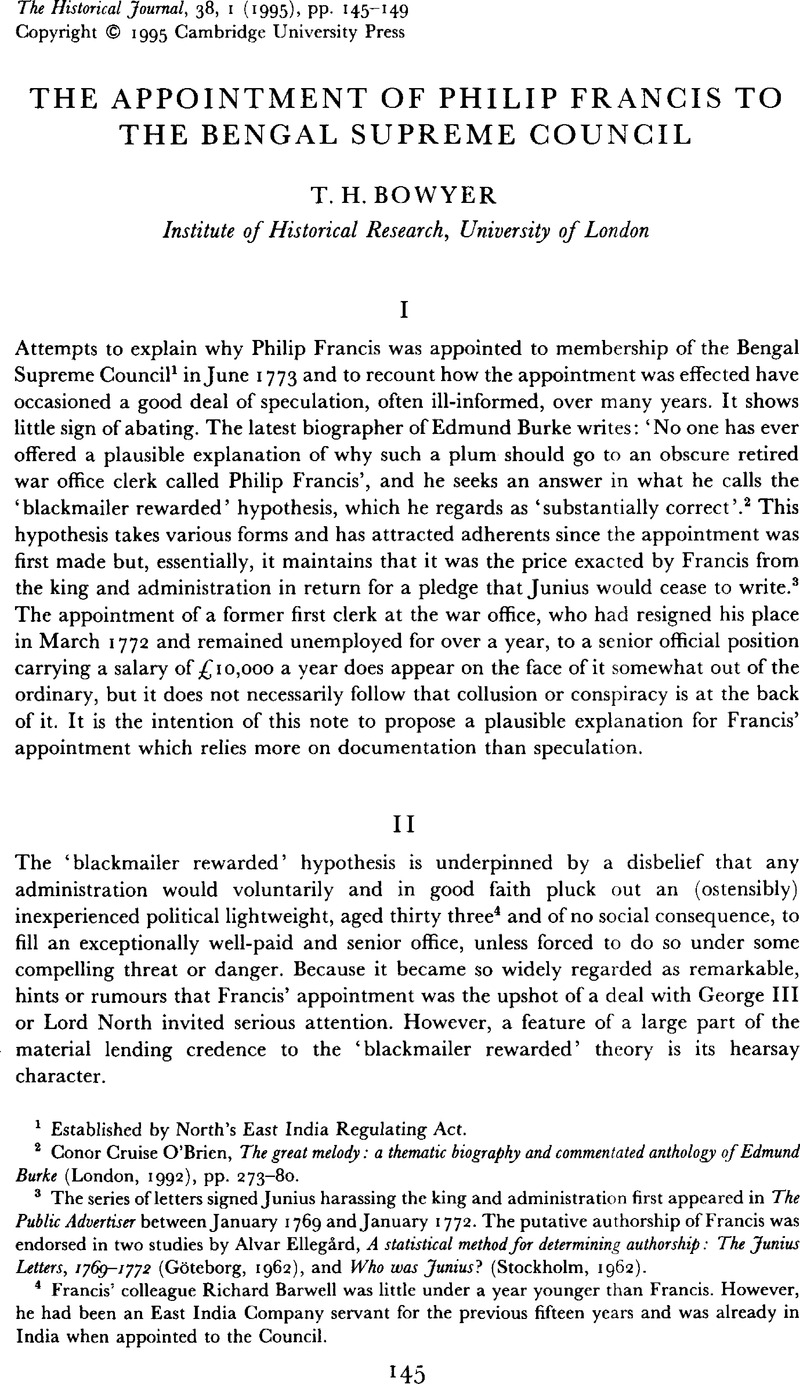No CrossRef data available.
Article contents
The appointment of Philip Francis to the Bengal Supreme Council
Published online by Cambridge University Press: 11 February 2009
Abstract

- Type
- Communications
- Information
- Copyright
- Copyright Cambridge University Press 1995
References
1 Established by North's East India Regulating Act.
2 Conor Cruise, O'Brien, The great melody: a thematic biography and commentated anthology of Edmund Burke (London, 1992), pp. 273–80.Google Scholar
3 The series of letters signed Junius harassing the king and administration first appeared in The Public Advertiser between January 1769 and January 1772. The putative authorship of Francis was endorsed in two studies by Alvar, Ellegård, A statistical method for determining authorship: The Junius Letters, 1769–1772 (Göteborg, 1962)Google Scholar, and Who was Junius? (Stockholm, 1962).Google Scholar
4 Francis' colleague Richard Barwell was little under a year younger than Francis. However, he had been an East India Company servant for the previous fifteen years and was already in India when appointed to the Council.
5 Memoirs of Sir Philip Francis, K.C.B. with correspondence and journals [hereafter Memoirs], commenced by the late Joseph, Parkes, completed and edited by Herman, Merivale (2 vols., London, 1867), I, 456.Google Scholar
6 Francis, H. R., Junius revealed (London, 1894), p. 51ff.Google Scholar
7 Medwin's conversations of Lord Byron, ed. Lovell, Ernest J. jr., (Princeton, 1966), p. 202.CrossRefGoogle Scholar
8 The historical and posthumous memoirs of Sir Nathaniel William Wraxall, 1773–1784, ed. Wheatley, Henry B. (5 vols., London, 1884), I, 337Google Scholar; Memoirs, I, 325.
9 Lord, Campbell, The lives of the Lord Chancellors (8 vols., London, 1845–1869), VI, 346–7 nGoogle Scholar. Lady Francis is a notoriously unreliable source regarding her husband's affairs.
10 Ibid.The lives of the Chief Justices of England (3 vols., London, 1849–1857), II 490.Google Scholar
11 Lord, Brougham, Historical sketches of statesmen who flourished in the time of George III (second series) (London, 1839), p. 88.Google Scholar
12 An eighteenth-century Secretary at War: the papers of William Viscount Barrington, ed. Tony, Hayter (London, 1988), pp. 68–9.Google Scholar
13 John, Kaye [review of The correspondence of Edmund Burke, ed. Fitzwilliam, and Bourke, (4 vols., London, 1844)]Google Scholar, Calcutta Review, II (1844), 570.Google Scholar
14 The Letters of Junius, ed. John, Cannon (Oxford, 1978), p. 555.Google Scholar
15 Dilke, C. W., The papers of a critic (2 vols., London, 1875), II, 78.Google Scholar
16 Ibid. p. 133.
17 Sophia, Weitzman, Warren Hastings and Philip Francis (Manchester, 1929), pp. 18–20Google Scholar. Weitzman entertained exaggerated ideas of Francis' moral turpitude comparing him with the Borgias, p. 134.
18 Critical and historical essays, new edn (London, 1869), p. 619.Google Scholar
19 Dictionary of national biography, VII, 616.Google Scholar
20 Dame Lucy, Sutherland, The East India Company in eighteenth-century politics (Oxford, 1952), p. 295 n.Google Scholar
21 See discussion in The Letters of Junius, ed. Cannon, , pp. 552–4.Google Scholar
22 The translation was published in the name of the Reverend Stephen Baggs, a relative, to whom Francis handed over his work. Memoirs, I, 366.
23 Ibid. Francis had to support his wife and six children. He had no regular private income but had been bequeathed £1,000 in the will of John Calcraft who had died in August 1772.
24 D'Oyly occupied the seat at Wareham, which Calcraft had earmarked for Francis, as a caretaker from 1774–80. He was a friend of Clive. See The history of parliament. The house of commons, 1754–1790 [hereafter House of Commons, 1754–1790], ed. SirNamier, Lewis and Brooke, John (3 vols., London, 1964), II, 336–7.Google Scholar
25 Memoirs, I, 366–7.
26 MSS Eur. D. 18, fo. 5, India Office Library and Records.
27 North to George III [8 June 1773], The correspondence of George III, ed. SirFortescue, John (6 vols., London, 1927–1928), II, no. 1267.Google Scholar
28 George III to North, 8 June 1773, ibid. no. 1265.
29 Francis did not then know that there would be a delay of ten months before he could start earning. The councillors did not sail until April 1774 and on 23 February 1774 he wrote to Edward Wheler, the chairman of the East India Company, asking for a quarter's salary in advance, ‘the expence of preparations and the situation of my family make it necessary’. MSS Eur. E12, fo. 334, India Office Library and Records.
30 Exemplified by Charles Wolfran Cornwall, subsequently a Lord of the Treasury and Speaker of the House of Commons, who, rejecting an approach from North, told him, ‘I had rather take my Chance at Home’. Cornwall to Charles Jenkinson, n.d., Add. MSS 38, 207, fo. 359, British Library.
31 See House of Commons, 1754–1790, II, 217–18.Google Scholar
32 Ibid, III, 151–2.
33 Cholwell was called to the Bar in 1740, the year of Francis' birth. He became a Bencher of the Inner Temple in 1778 and died in 1781. A calendar of the Inner Temple records, ed. Inderwick, F. A. and Roberts, R. A. (5 vols., London, 1896–1936), IV, 416Google Scholar; V, 348 and 392.
34 Sir George Macartney, diplomat and later Governor of Madras, was obstructed by North's reservations about him; Andrew Stuart, a Scottish Member of Parliament who had strong East India Company connections, was objected to by the king. The other two applicants were the Edinburgh philosopher Adam Ferguson and Peter Lascelles, an East India Company director.
35 See Francis MSS, especially MSS Eur. E12, India Office Library and Records.


